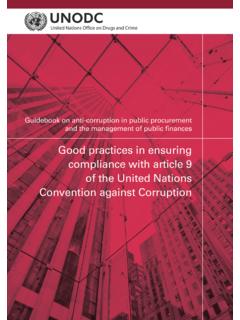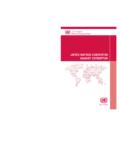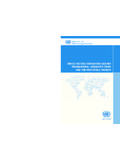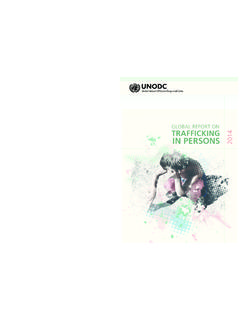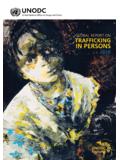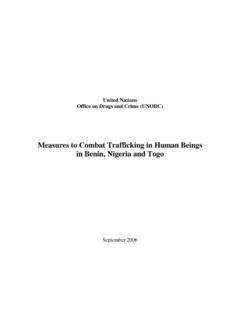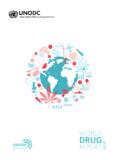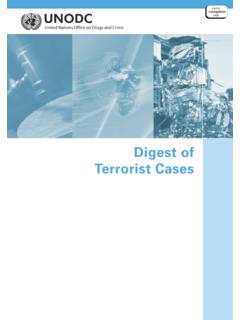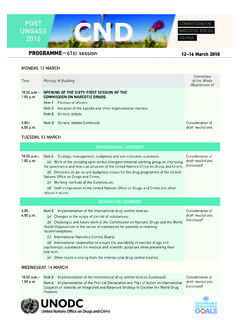Transcription of Anti-human trafficking manual for criminal justice ...
1 Vienna International Centre, PO Box 500, 1400 Vienna, Austria Tel.: (+43-1) 26060-0, Fax: (+43-1) 26060-5866, trafficking manual for criminal justice practitionersModule 6 Printed in August 2009 300 united nations office ON DRUGS AND crime ViennaAnti- human trafficking manual for criminal justice practitioners Module 6:International cooperation in trafficking in persons casesUNITED NATIONSNew York, 2009 The designations employed and the presentation of the material in this publication do not imply the expression of any opinion whatsoever on the part of the Secretariat of the united nations concerning the legal status of any country, territory, city or area, or of its authorities, or concerning the delimitation of its frontiers or bounda-ries.
2 Countries and areas are referred to by the names that were in official use at the time the relevant data were publication has not been formally 6: International cooperation in trafficking in persons casesObjectivesOn completing this module users will be able to:Explain why international cooperation is likely to be required in trafficking cases; "Recall the different forms of international cooperation; "Give examples of both formal and informal international cooperation; "Recall the principles of international cooperation; "Describe the impact differing legal systems have on extradition proceedings; "Describe the types of international cooperation that can be provided as defined by the " united nations Convention Against Transnational Organized crime (UNTOC);Recall the process involved in making a formal request for mutual legal assistance; "Recall what should be included in a formal letter of request for international "cooperation;Explain when it is appropriate and not appropriate to use informal requests for interna- "tional cooperation;Describe the actions required when making urgent and officer to officer requests.
3 "Explain the considerations when making officer/investigator to public contact in another "jurisdiction;Recall the considerations when officers/investigators visit other jurisdictions; "Describe actions when sharing information between jurisdictions; "Describe the actions required when considering the repatriation of victims of trafficking "in cooperation to combat trafficking in persons International cooperation in criminal matters is an essential prerequisite to combat trafficking in persons. A significant proportion of trafficking in persons cases are transnational and even those cases within a single jurisdiction may involve victims or offenders who originate outside that jurisdiction.
4 A given set of facts may justify and give rise to criminal investigations and prosecutions in multiple jurisdictions. Informal and formal methods of international cooperation are important in order to deprive traffickers safe Anti-human trafficking manual FOR criminal justice PRACTITIONERSI nternational cooperation in criminal matters can be very challenging and requires knowledge, planning and awareness of practical issues at stake in both the requested and the requesting States. Some of these issues include but are not limited to the cost of investigations, the venue of trial, the applicable legal framework, nationality, the location of witnesses, the location of offenders, gathering of evidence and admissibility of evidence rules.
5 However, with a little experience, the benefits of using tools of international cooperation will greatly outweigh these forms of international cooperation include, among others:Extradition; "Mutual legal assistance; "Transfer of criminal proceedings; "Transfer of sentenced persons; "Cooperation for purposes of confiscation to deprive traffickers of criminal assets; "Cooperation between law enforcement authorities including exchanging information and "cooperation in conducting inquiries;Joint investigations; "Cooperation in using special investigative techniques. "Channels of communication of international cooperation include (who is contacted will depend on the type of cooperation needed, legal requirements of the requested state and the provisions of the agreement in issue): Competent national authorities or central authorities; "Diplomatic staff; "Law enforcement officials.
6 "It should be noted that the forms of cooperation mentioned above could complement each other with a view to ensuring that the widest measure of assistance is afforded in investigations, prosecutions and judicial proceedings related to trafficking in persons. Examples of more structured forms of cooperation in law enforcement include:Posting liaison officers to facilitate cooperation with the host government s law "enforcement officers in criminal investigations;Bilateral and multilateral agreements and arrangements on law enforcement cooperation "and on the sharing of law enforcement information;Cooperation within such structures as the International criminal Police Organization "(INTERPOL), or various regional cooperation structures such as the European Police office (Europol) or cooperation in criminal matters provides a more formal framework for cooperation compared with the cooperation in law enforcement.
7 The tools available are based on bilateral and multilateral agreements and arrangements or, in some cases and in the absence of such agreements and arrangements, directly on national 6: International cooperation in trafficking in persons cases 3 Both informal and formal law enforcement cooperation, however, have been hampered by a number of problems, such as:Diversity of legal systems; "Diversity of law enforcement structures; "Absence of channels of communication for the exchange, for example, of basic "information and criminal intelligence;Diversity in approaches and priorities; "Lack of trust. " Case exampleIn some jurisdictions the police have considerable autonomy, directing and conducting enquiries.
8 Within such a system there may be a culture of very informal officer-to-officer contact. Prosecu-tors and courts accept such informal contact. For instance in Re Sealed s case, the united States Court of Appeals rejected the argument that Untied States law enforcement agencies were limited to obtaining evidence in accordance with the provisions set out in the mutual legal assistance treaty signed by the Swiss and united States Governments. In other systems the police may be directed by investigating prosecutors or magistrates and such direct informal contact would not be acceptable. Misunderstandings can arise if those working under one system do not understand the other 2d 1268 (1987), US Ct of Appeals for the District of ColumbiaThe united nations Convention Against Transnational Organized crime (UNTOC) contains detailed provisions on both formal and informal cooperation in criminal matters, which are also applica-ble, mutatis mutandis, to the trafficking Protocol, as follows:Extradition (art.)
9 16); Transfer of sentenced persons (art. 17); Mutual legal assistance (art. 18); Joint investigations (art. 19); Cooperation in using special investigative techniques (art. 20); Transfer of criminal proceedings (art. 21); International cooperation for purposes of confiscation (art. 13-14); Law enforcement cooperation (art. 27). 4 Anti-human trafficking manual FOR criminal justice PRACTITIONERSIn general terms, States parties can use UNTOC as a legal basis for international cooperation. In the field of extradition, States parties that make extradition conditional on the existence of a treaty are required to inform the Secretary-General whether they will consider the Convention as the legal basis for this form of cooperation.
10 States may also use national legislation and/or the principle of reciprocity to execute extradition requests. In the field of mutual legal assistance, article 18 includes a set of provisions that can be used by countries not bound by relevant bilateral treaties or by States that have already concluded such treaties and may wish to complement them. Case exampleA case investigated in Bulgaria involved extensive cooperation with the Netherlands. The Dutch prosecutor contacted the International Legal Assistance department of the Supreme Cassation Prosecutors office in Sofia to establish which colleague was working on the case in question in Bulgaria.
